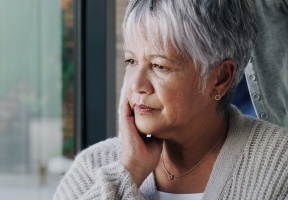By Sindy M. Benavides, CEO of the League of United Latin American Citizens (LULAC)
Edited by Lawndale Bilingual News
 Every time we turn on the news or check our cell phones, it seems like there is bad news happening everywhere, and all the time. Everyone you speak with is talking about the current state of the world and it’s been bleak lately. Whether it is the newest COVID-19 variant, war, violence in our own country, polarizing political discourse, high inflation and gas prices, or fears of a recession, for many older Latinos it can feel like the sky is falling.
Every time we turn on the news or check our cell phones, it seems like there is bad news happening everywhere, and all the time. Everyone you speak with is talking about the current state of the world and it’s been bleak lately. Whether it is the newest COVID-19 variant, war, violence in our own country, polarizing political discourse, high inflation and gas prices, or fears of a recession, for many older Latinos it can feel like the sky is falling.
It’s why LULAC (League of United Latin American Citizens) appreciates the efforts of sponsors like AARP, the nation’s largest non-profit/non-partisan organization dedicated to empowering Americans 50 and older to choose how they live as they age, to reach older Latino audiences about mental health resources.
The more we consume bad news and go down the negative spiral — dubbed as “doomscrolling” by experts — the more the impulse to consume it becomes harder to resist. Experts agree that as humans, we are hardwired to anticipate danger, explaining the pattern of frequent monitoring. However, reading bad news all day can take a serious toll on mental health. Studies have linked the consumption of bad news to increased distress, anxiety and depression.
In addition to the negative news that may cause emotional unrest, a recent study from AARP published in June 2022 shows that nearly 2 out of 3 women age 50 and older say they are regularly discriminated against, and those experiences appear to be taking a toll on their mental health as well.
The mental health needs of older adults in the Latino community are often not obvious, regardless of whether the root of their emotional unease stems from external events or internal reasons. For example, depression is one of the most common mental illnesses, affecting 6.7 percent (more than 16 million) of American adults each year, but one of the hardest illnesses to identify.
According to AARP, among the symptoms of depression are changes in energy levels; irritability or anger; loss of interest in once-enjoyable activities; difficulty sleeping or sleeping more than usual; eating more or less than usual; and thoughts of death or suicide.
AARP offers eight simple habits to make you happier that are free or inexpensive. As we come out of the pandemic’s worst days– when we all suffered from social isolation, fear of getting ill or even death, and constant news of high hospitalization and death rates– implementing simple actions into your daily routine such as greeting the dawn, going outside and drawing something, walking the woods or practicing mindfulness, are some ways to feel better if you do them often.
Putting the phone down sometimes doesn’t mean Americans should not be informed about current events. In fact, LULAC believes that being an active and contributing member of society means being informed and getting involved with issues and causes that you or your loved ones are passionate about. However, the shift to digital news with alerts on our cell phones constantly pinging us with world events, regardless of what we’re doing, is not healthy in the long-term.
Learning to accept what is beyond our control and refocus our attention on factors we can manage, like taking care of ourselves by maintaining healthy habits will go a long way to ensuring that we have the emotional bandwidth to advocate for what matters most to us.
Sponsor Content AARP.org








